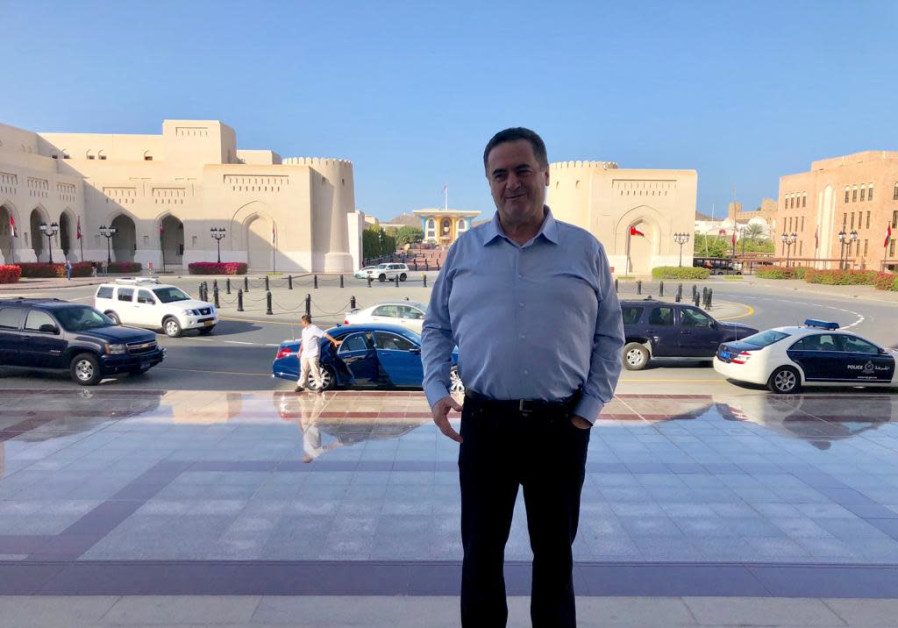US Special Envoy Jason Greenblatt tweeted his support for the rail line as Israeli Minister of Transportation and Intelligence Israel Katz made a historic visit to Oman.

The Trump Administration has backed an Israeli plan to link Haifa with Jordan, Saudi Arabia and the Gulf states, hinting that it was in line with the US peace plan to resolve the Israeli-Palestinian conflict.
US Special Envoy Jason Greenblatt tweeted his support for the rail line as Israeli Minister of Transportation and Intelligence Israel Katz made a historic visit to Oman to present its details to an international transportation event, the IRU World Congress.
“Today Transportation & Intelligence Minister @Israel_Katz is in Oman at an [international] transportation event,” Greenblatt tweeted. “He will present a plan for the construction of a railway [between] Israel, Jordan, Saudi Arabia & the Gulf. Let’s keep the dialogue going. These efforts support our efforts.”
Katz is expected to address the congress and participate in its panels, a first for an Israeli minister in Oman – a Muslim Gulf country that has no ties with Israel. The minister’s office tweeted that this was “the first time the United States has publicly supported the plan,” which is called “Tracks for Regional Peace.” The plan was developed by both Katz and the prime minister.
A Middle East rail line would be a “dramatic development that may affect many countries in the region,” Katz’s office said. He has spent two years gaining supporters for the plan, including of some Arab officials in the region.
“The invitation of the Government of Oman and the visit are part of a comprehensive move to promote the initiative and strengthen the ties with the pragmatic states in the region,” the minister’s office said. As he left for Oman on Sunday, Katz added: “This is a historic visit that will strengthen relations.” He noted that the rail line which will connect Israel with the Gulf countries will bypass Iran.
Last month Omani Minister of Foreign Affairs Yusuf bin Alawi publicly called for normalized relations with Israel. In October, Netanyahu traveled to Oman and met with its leader, Sultan Sayyid Qaboos bin Said Al Said.
Greenblatt was in Israel to speak with Israeli officials in wake of the unveiling of the US peace plan this winter. On Sunday night, he met with Netanyahu, and later tweeted that they had “discussed important topics including the situation in Gaza and regional developments.”
The Palestinians have persistently refused to meet with US officials. No public meetings were scheduled with the PA.
Although later Greenblatt tweeted: “I appreciated a candid discussion yesterday on the path to peace with Palestinian friends. We’re committed to hearing from all partners who share this goal.”
Separately, Netanyahu met on Monday with US Special Representative for Syria Engagement James Jeffrey. “The two discussed developments in Syria and efforts against Iranian aggression,” the Prime Minister’s Office said.
On Sunday, Petra News Agency reported that Jordan and Israel are likely to hold talks over Amman’s decision to rescind a 25-year land deal that allowed Israel to use two of its border areas. Israel has requested discussions on border territories, the Jordanian Minister for Media Affairs Jumana Ghunaimat said.
Under terms laid out in the 1994 Treaty of Peace between Israel and Jordan, Israel has used the area of Naharayim (Baqura) near Lake Kinneret (Sea of Galilee) and part of Tzofar (al Ghamar) in the Arava. Last month, Jordan said it planned to use a clause in the agreement that would allow it to cancel the deal.
Jordanian Minister of Foreign Affairs Ayman Safadi told Reuters last month that the deal, which was signed in October 1994, had been conceived as a temporary arrangement from the start.
“That is why there was a time cap on it,” Safadi told Reuters. “We acted within the provisions of the peace treaty. This is an indication of our commitment to the peace treaty. There has never been a question of our solid commitment to the treaty.”
Ghunaimat said that Jordan was committed to holding consultations with Israel on the matter, but in a way that preserved the country’s national interests. No date was set for the talks.
On Thursday, President Reuven Rivlin is expected to receive diplomatic credentials from the incoming Jordanian Ambassador Ghassan Majali and Egyptian Ambassador Khaled Azmi.
As reported by The Jerusalem Post
